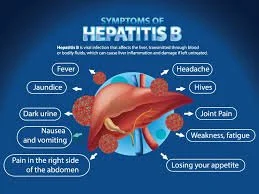Understanding Hepatitis B: An Interview
Hepatitis B is a serious liver infection caused by the hepatitis B virus (HBV). It affects millions of people worldwide and can lead to chronic liver disease, liver cancer, and even death. I recently interviewed a close friend who has been living with hepatitis B for several years. Through their personal experience, we explore what hepatitis B is, its symptoms, diagnosis, causes, pathology, treatments, and what it’s like to live with the disease.
What is Hepatitis B?
Hepatitis B is a viral infection that attacks the liver and can cause both acute and chronic liver disease. My friend described it as "a virus that can linger in your body for years without you even knowing it’s there." The virus is primarily spread through contact with infectious body fluids, such as blood, semen, and vaginal secretions. Unlike hepatitis A, which is transmitted through contaminated food or water, hepatitis B is a blood-borne virus.
Symptoms of Hepatitis B
When I asked my friend about their symptoms, they told me, "The scariest part was that I didn’t have any symptoms at first. I found out I had hepatitis B during a routine blood test." This asymptomatic phase is common in many people, especially those with chronic hepatitis B. However, when symptoms do appear, they can include:
Fatigue: "I was always tired, no matter how much sleep I got."
Jaundice: "My skin and the whites of my eyes turned yellow."
Dark Urine: "I noticed my urine was much darker than usual."
Abdominal Pain: "I had this persistent pain on the right side of my abdomen."
Loss of Appetite: "I just didn’t feel like eating."
Nausea and Vomiting: "I felt nauseous a lot and even threw up a few times."
Diagnosis of Hepatitis B
My friend explained how they were diagnosed: "I went in for a routine check-up, and my doctor ran some blood tests. That’s when they found elevated liver enzymes and suggested further testing." The diagnosis of hepatitis B typically involves:
Blood Tests: These detect the presence of hepatitis B surface antigens (HBsAg), antibodies to hepatitis B core antigens (anti-HBc), and antibodies to hepatitis B surface antigens (anti-HBs).
Liver Function Tests: These assess how well the liver is functioning and help determine the extent of liver damage.
HBV DNA Test: This measures the amount of hepatitis B virus in the blood, indicating how active the infection is.
"Finding out I had hepatitis B was a shock," my friend said. "I didn’t even know I had been exposed to the virus."
Causes of Hepatitis B
The hepatitis B virus is transmitted through contact with infectious body fluids. I asked my friend if they knew how they contracted the virus. "Honestly, I’m not sure," they replied. "It could have been from a number of things—maybe a minor medical procedure, or even something as simple as sharing a razor."
Hepatitis B can be contracted through:
Unprotected Sexual Contact: With an infected person.
Sharing Needles: Common among people who inject drugs.
Mother to Child: During childbirth.
Contaminated Blood Products: Although this is rare in countries where blood is screened.
Sharing Personal Items: Such as razors or toothbrushes with an infected person.
Pathology of Hepatitis B
To understand the pathology of hepatitis B, I asked my friend about how the virus affects the body. "The virus attacks the liver," they explained. "It enters the liver cells and starts to replicate, causing inflammation and damage over time."
The hepatitis B virus primarily targets the liver, leading to:
Acute Hepatitis: This occurs shortly after exposure and can range from mild to severe. Some people clear the virus from their body naturally, while others progress to chronic infection.
Chronic Hepatitis: If the virus persists for more than six months, it becomes chronic. Chronic hepatitis B can lead to ongoing liver damage, cirrhosis (scarring of the liver), liver failure, and liver cancer.
Immune Response: The body’s immune response to the virus causes inflammation, which can damage liver cells and lead to fibrosis (scarring).
Treatments for Hepatitis B
When it comes to treatment, my friend shared their experience: "My doctor told me there’s no cure for hepatitis B, but there are treatments to manage the virus and protect my liver."
The treatments for hepatitis B include:
Antiviral Medications: Drugs like tenofovir and entecavir can help reduce the amount of virus in the blood and prevent liver damage. "I take antiviral medication daily," my friend said. "It keeps the virus under control."
Monitoring: Regular blood tests and liver ultrasounds are essential to monitor the virus and assess liver health. "I go for check-ups every six months to make sure everything’s stable."
Lifestyle Changes: "My doctor recommended I avoid alcohol and be careful with medications that can affect the liver," they explained. Maintaining a healthy lifestyle, including a balanced diet and regular exercise, is also crucial.
For those with acute hepatitis B, treatment typically involves supportive care, as the infection may resolve on its own. In chronic cases, antiviral medications are used to prevent complications.
Conclusion: Living with Hepatitis B
As our conversation came to a close, I asked my friend how they manage living with hepatitis B. "It’s a part of my life now," they said. "At first, I was scared and overwhelmed, but with the right treatment and support, I’m able to live a normal life. The key is to stay informed, take your medications, and keep up with regular check-ups."
Hepatitis B is a serious condition, but with early diagnosis and proper management, individuals can lead healthy lives. My friend’s story is a testament to the importance of awareness, testing, and treatment. If you think you may be at risk for hepatitis B or have been exposed to the virus, it’s essential to get tested and seek medical advice.

